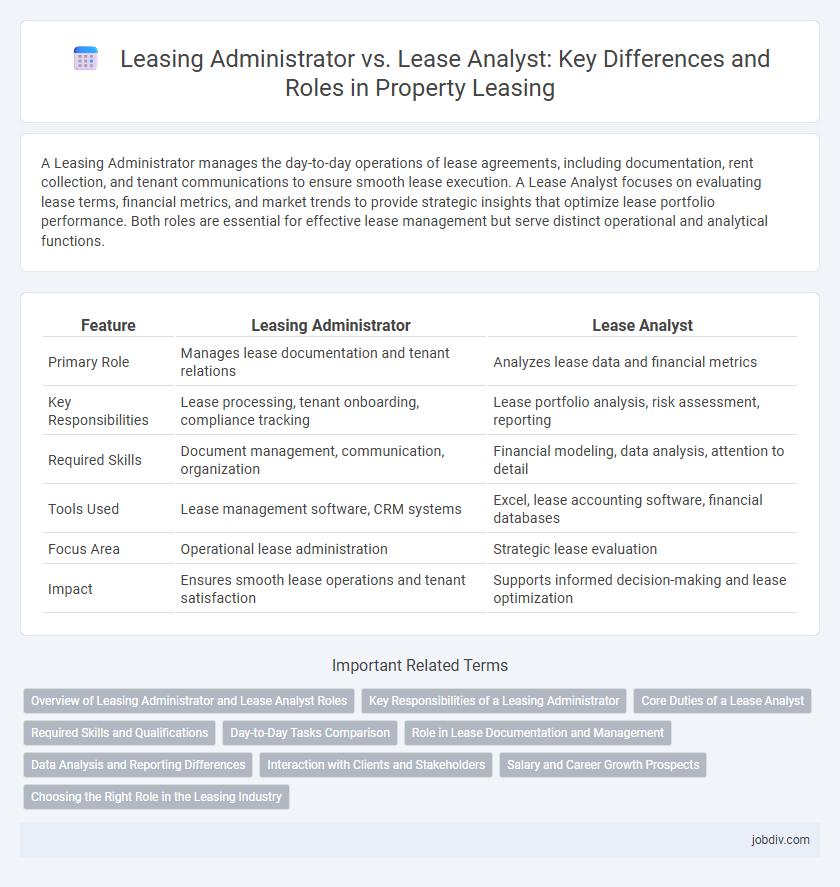A Leasing Administrator manages the day-to-day operations of lease agreements, including documentation, rent collection, and tenant communications to ensure smooth lease execution. A Lease Analyst focuses on evaluating lease terms, financial metrics, and market trends to provide strategic insights that optimize lease portfolio performance. Both roles are essential for effective lease management but serve distinct operational and analytical functions.
Table of Comparison
| Feature | Leasing Administrator | Lease Analyst |
|---|---|---|
| Primary Role | Manages lease documentation and tenant relations | Analyzes lease data and financial metrics |
| Key Responsibilities | Lease processing, tenant onboarding, compliance tracking | Lease portfolio analysis, risk assessment, reporting |
| Required Skills | Document management, communication, organization | Financial modeling, data analysis, attention to detail |
| Tools Used | Lease management software, CRM systems | Excel, lease accounting software, financial databases |
| Focus Area | Operational lease administration | Strategic lease evaluation |
| Impact | Ensures smooth lease operations and tenant satisfaction | Supports informed decision-making and lease optimization |
Overview of Leasing Administrator and Lease Analyst Roles
Leasing Administrators manage lease documentation, ensuring compliance with contractual terms and maintaining accurate records for property management. Lease Analysts focus on evaluating lease agreements, analyzing financial implications, and providing insights to optimize lease portfolio performance. Both roles are integral to effective leasing operations but emphasize administrative accuracy versus strategic financial analysis.
Key Responsibilities of a Leasing Administrator
A Leasing Administrator oversees lease document preparation, tenant communications, and lease tracking to ensure compliance with contractual terms. They manage lease renewals, coordinate inspections, and maintain accurate records in leasing databases to support operational efficiency. This role requires strong organizational skills and attention to detail to facilitate smooth lease administration processes.
Core Duties of a Lease Analyst
A Lease Analyst primarily focuses on evaluating lease agreements, conducting financial analysis, and ensuring compliance with lease accounting standards such as ASC 842 or IFRS 16. They analyze rent schedules, calculate lease liabilities, and prepare detailed reports to support lease portfolio management and decision-making. Unlike a Leasing Administrator who manages lease documentation and tenant communications, the Lease Analyst provides critical insights to optimize lease performance and risk management.
Required Skills and Qualifications
Leasing Administrators require strong organizational skills, proficiency in lease documentation, and experience with property management software to ensure accurate lease tracking and compliance. Lease Analysts must possess advanced analytical abilities, financial modeling expertise, and in-depth knowledge of lease accounting standards such as ASC 842 or IFRS 16. Both roles benefit from attention to detail, excellent communication skills, and a solid understanding of real estate leasing terms and regulations.
Day-to-Day Tasks Comparison
A Leasing Administrator manages lease documentation, processes tenant applications, and handles rent payments to ensure smooth property operations. A Lease Analyst evaluates lease agreements, conducts financial analysis, and tracks lease performance metrics to support strategic decision-making. Both roles require collaboration with property managers and tenants but differ in focus, with administrators emphasizing operational tasks and analysts concentrating on financial and contractual analysis.
Role in Lease Documentation and Management
A Leasing Administrator manages lease documentation by organizing, maintaining, and ensuring compliance with lease agreements, focusing on accuracy and timely execution. A Lease Analyst evaluates lease terms and financial data to provide insights on lease performance and risk, supporting strategic decision-making. Both roles play crucial functions in lease management, with the administrator handling operational tasks and the analyst offering analytical expertise.
Data Analysis and Reporting Differences
Leasing Administrators primarily handle lease documentation, tenant communications, and contract management, ensuring all data is accurately recorded and maintained. Lease Analysts focus on data analysis and reporting by evaluating lease performance metrics, financial forecasting, and portfolio optimization to support strategic decision-making. The key difference lies in the Lease Analyst's role in leveraging data analytics tools to generate actionable insights, whereas Leasing Administrators emphasize administrative data accuracy and operational compliance.
Interaction with Clients and Stakeholders
Leasing Administrators manage daily communications with tenants and property managers to ensure lease compliance and address billing or maintenance issues promptly. Lease Analysts engage closely with clients and stakeholders to evaluate lease terms, assess financial impacts, and support negotiation strategies based on detailed market and contract analysis. Both roles require strong collaboration skills, but Leasing Administrators prioritize operational interaction while Lease Analysts focus on strategic and analytical client engagement.
Salary and Career Growth Prospects
Leasing Administrators typically earn between $45,000 and $60,000 annually, focusing on lease documentation and tenant coordination, while Lease Analysts command higher salaries ranging from $60,000 to $80,000 due to their expertise in financial analysis and portfolio management. Career growth for Leasing Administrators often leads to roles in property management or leasing coordination, whereas Lease Analysts have pathways to senior financial analyst or real estate asset management positions, reflecting their strategic impact on leasing decisions. Market demand for Lease Analysts is increasing as companies prioritize data-driven lease optimization, enhancing salary and advancement opportunities in comparison to traditional Leasing Administrator roles.
Choosing the Right Role in the Leasing Industry
Leasing Administrators manage lease documentation, track payments, and ensure compliance with lease terms to maintain smooth tenant relationships. Lease Analysts focus on financial evaluation, market research, and lease portfolio performance to optimize leasing strategies and profitability. Selecting the right role depends on whether you prefer operational lease management or in-depth financial and data analysis within the leasing industry.
Leasing Administrator vs Lease Analyst Infographic

 jobdiv.com
jobdiv.com